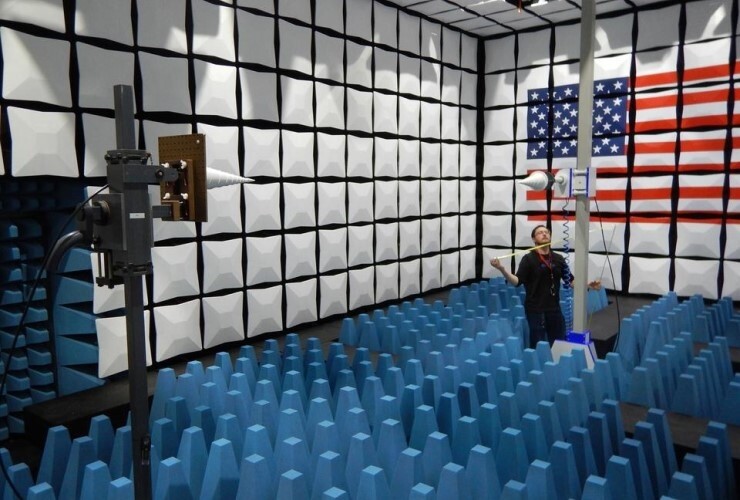
A NIST researcher prepares to run tests in one of the agency’s anechoic chambers, which enables the accurate measurements of radiofrequency waves used in wireless communications.
(Image credit – NIST)

A NIST researcher prepares to run tests in one of the agency’s anechoic chambers, which enables the accurate measurements of radiofrequency waves used in wireless communications.
(Image credit – NIST)
At a hearing
In recent years, some federal policymakers and lawmakers have grown wary of efforts, particularly by China
Testifying at the hearing were acting NIST Director James Olthoff, Cisco Systems Chief Technology Officer Alissa Cooper, intellectual property attorney Andrew Updegrove, and Mary Saunders, the head of federal relations at the American National Standards Institute, a nonprofit organization that coordinates U.S. industry groups’ efforts in standards development.
Opening the hearing, Research and Technology Subcommittee Chair Haley Stevens (D-MI) distinguished
Stevens warned against implementing “heavy-handed government policies” as a response to other countries’ tactics — a view echoed by Subcommittee Ranking Member Randy Feenstra (R-IA), who explained
Witnesses at the hearing pointed to perceptions and policy developments they saw as threatening the benefits gained from the current U.S. approach.
Seeking to temper concerns about China’s growing influence, Saunders remarked, “While China has increased its participation in the International Organization for Standardization
Cooper argued that attempts to block other countries’ participation in standards activities would be counterproductive, saying, “I have witnessed these consequences firsthand as a standards leader and participant. For example, the industry has experienced these effects as a result of actions taken in recent years by the Department of Commerce’s Bureau of Industry and Security to extend U.S. export-control restrictions to standards-development activities.”
Updegrove cited the bureau’s addition of Chinese telecommunications company Huawei to its Entity List
Later in the hearing, Updegrove also pointed to the decision
In addition to highlighting past policy moves, committee members and witnesses called attention to pending legislative proposals they regard as ill-conceived.
Updegrove, for instance, criticized proposals that would seek to require SSOs to demonstrate their commitment to democratic values, arguing, “However well-intentioned, and they are, such laws if enacted would represent an existential threat to global standards development. If the U.S. can impose its own national mandates on SSOs, why not the European Union, or China, or the Russian Federation?”
Stevens spotlighted two separate provisions in the Senate’s U.S. Innovation and Competition Act that would respectively give the State Department
Olthoff, Saunders, and Cooper all attested to the strength of current coordination between NIST, NTIA, and the State Department. Updegrove further underscored the value of NIST’s familiarity with the standards process itself. “The global standards infrastructure is sort of an alternative government system and, like most government systems, there’s a lot of ins and outs, there’s a lot of delicacy and nuance, and NIST has decades of experience in navigating that landscape. It’s not an easy expertise to pick up,” he said.
The hearing’s participants broadly agreed that strengthening NIST would be one of the best ways to improve the U.S. position in international standards-setting.
Both Stevens and Feenstra advocated for increasing NIST’s budget to strengthen its technical support to industry in emerging technology areas, as proposed in the committee’s bipartisan NIST for the Future Act
Some committee members focused on the respective roles of government, industry, and academia in standards-setting at different stages of a technology’s maturity.
Asked by Feenstra about setting standards in emerging areas such as quantum technology and artificial intelligence, Saunders said, “I think an important contributor — and NIST is very active in this area — is something called pre-standardization research. … It has to do with doing underpinning measurement and related research to provide support for robust technical standards. That’s important and the federal government can play a role here in filling gaps in early-stage technologies.”
Asked by Rep. Jim Baird (R-IN) about the benefits of developing a national strategy for standards, Cooper suggested that the federal government should develop a high-level strategy that would guide standards-related R&D while preserving industry’s discretion in choosing standards-development strategies for particular technologies.
“I think now is an important moment for the U.S. to assert its own strategy, in particular because it can be valuable as a contrast to what the European Union has proposed. They’re really looking at taking much more of a government-directed approach that diminishes the role of industry. I think it would be useful for the U.S. to have a strategy that can … try to convince our allies to follow our approach,” she said.
Saunders observed that ANSI has already developed a standards strategy
“Certainly a clear statement from the government regarding the government’s interest in critical and emerging technologies and support for the robust private-sector system, and the underpinning rules that provide the basis for that system, would be valuable in the context of the other strategies that we’ve seen emerging globally,” she remarked.